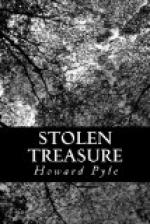“Let me see it,” said Parson Jones. He adjusted the spectacles a little more firmly astride of his nose as he took the paper in his hand and began conning it. “What’s all this?” he said; “a whole lot of figures and nothing else.” And then he read aloud, “‘Mark—S.S.W. by S.’ What d’ye suppose that means, Tom?”
“I don’t know, sir,” said Tom. “But maybe we can understand it better if you read on.”
“Tis all a great lot of figures,” said Parson Jones, “without a grain of meaning in them so far as I can see, unless they be sailing directions.” And then he began reading again: “’Mark—S.S.W. by S. 40, 72, 91, 130, 151, 177, 202, 232, 256, 271’—d’ye see, it must be sailing directions—’299, 335, 362, 386, 415, 446, 469, 491, 522, 544, 571, 598’—what a lot of them there be—’626, 652, 676, 695, 724, 851, 876, 905, 940, 967. Peg. S.E. by E. 269 foot. Peg. S.S.W. by S. 427 foot. Peg. Dig to the west of this six foot.’”
“What’s that about a peg?” exclaimed Tom. “What’s that about a peg? And then there’s something about digging, too!” It was as though a sudden light began shining into his brain. He felt himself growing quickly very excited. “Read that over again, sir,” he cried. “Why, sir, you remember I told you they drove a peg into the sand. And don’t they say to dig close to it? Read it over again, sir—read it over again!”
“Peg?” said the good gentleman. “To be sure it was about a peg. Let’s look again. Yes, here it is. ‘Peg S.E. by E. 269 foot.’”
“Aye!” cried out Tom Chist again, in great excitement. “Don’t you remember what I told you, sir, 269 foot? Sure that must be what I saw ’em measuring with the line.” Parson Jones had now caught the flame of excitement that was blazing up so strongly in Tom’s breast. He felt as though some wonderful thing was about to happen to them. “To be sure, to be sure!” he called out, in a great big voice. “And then they measured out 427 foot south-southwest by south, and then they drove another peg, and then they buried the box six foot to the west of it. Why, Tom—why, Tom Chist! if we’ve read this aright, thy fortune is made.”
Tom Chist stood staring straight at the old gentleman’s excited face, and seeing nothing but it in all the bright infinity of sunshine. Were they, indeed, about to find the treasure-chest? He felt the sun very hot upon his shoulders, and he heard the harsh, insistent jarring of a tern that hovered and circled with forked tail and sharp white wings in the sunlight just above their heads; but all the time he stood staring into the good old gentleman’s face.
It was Parson Jones who first spoke. “But what do all these figures mean?” And Tom observed how the paper shook and rustled in the tremor of excitement that shook his hand. He raised the paper to the focus of his spectacles and began to read again. “‘Mark 40, 72, 91—’”
“Mark?” cried out Tom, almost screaming. “Why, that must mean the stake yonder; that must be the mark.” And he pointed to the oaken stick with its red tip blazing against the white shimmer of sand behind it.




